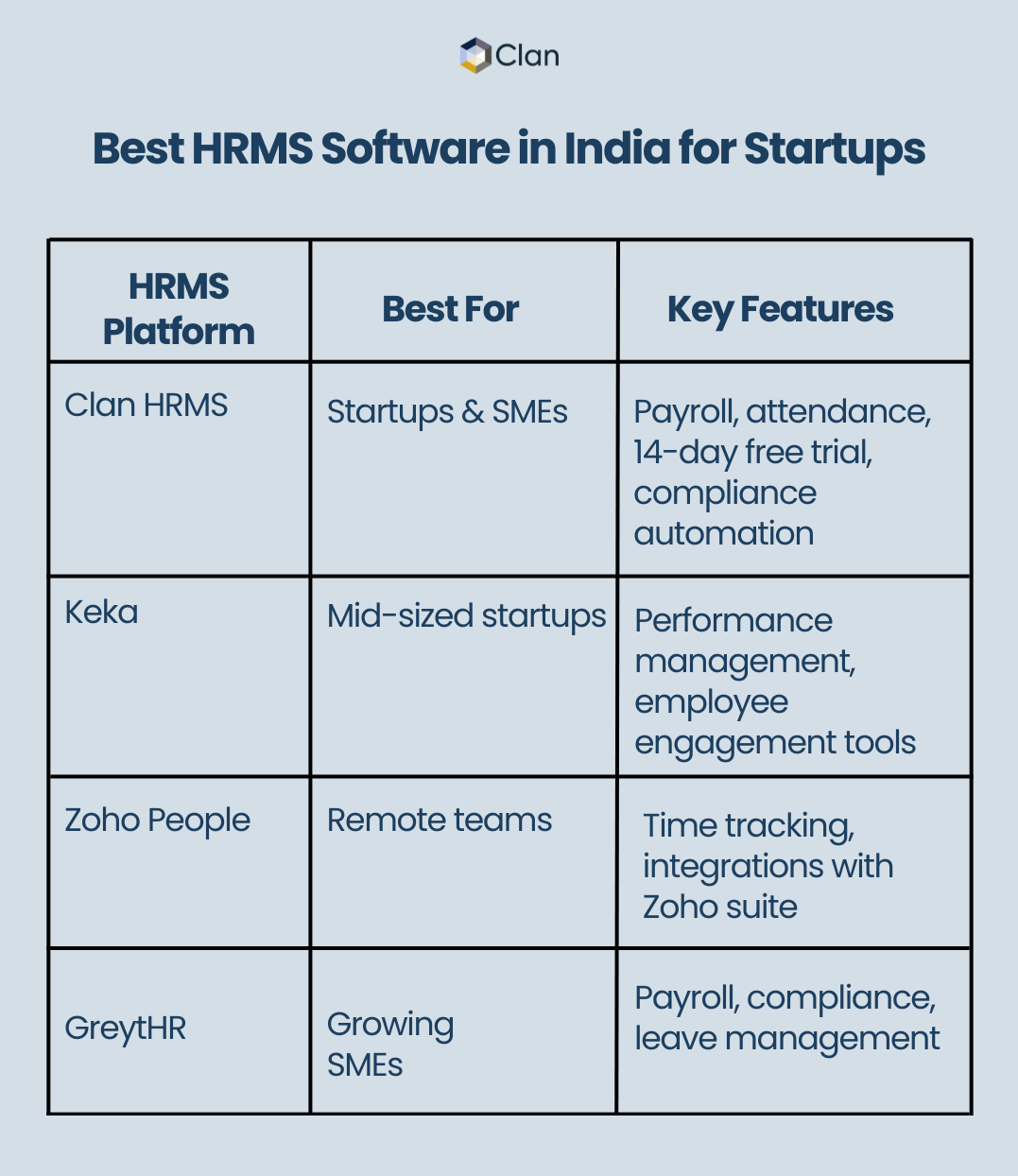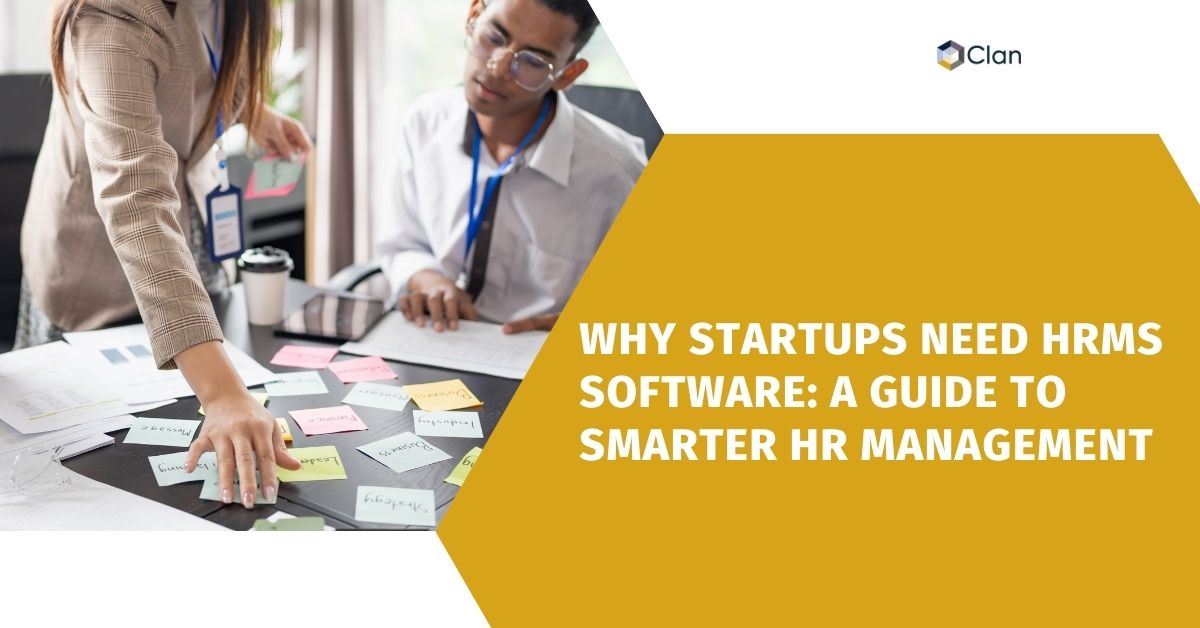In 2026, India’s startup ecosystem has crossed 180,000 registered startups, with more than 22,000 new companies joining this year alone. This rapid growth makes India one of the world’s largest and fastest-growing startup hubs. But with growth comes challenges manual HR tasks like payroll, attendance tracking, compliance, and onboarding often drain valuable time and money.
This is where HRMS software for startups becomes a game-changer. By automating payroll, leave management, and compliance filings, HRMS reduces HR administration time by up to 40-60%. With AI-driven features like smart dashboards and predictive insights, startups can focus on scaling their business instead of getting stuck in paperwork. The result? Lower operational costs, happier employees, and faster decision-making.
This blog’s main focus will be on defining the various characteristics of Human Resource Management System software, its importance to new businesses, the software’s functionalities, and the criteria for selecting the most suitable software.
What is HRMS Software and Why Do Startups Need It?
HRMS software is a computerized tool that consolidates all important HR processes and activities within a single system to minimize manual processes and ensure precision. For startups, it serves as a unified tool for HR activities that would otherwise require several different applications or spreadsheets.
Here’s how the key modules work:
- Payroll Software
- Automates monthly salary processing by calculating basic pay, allowances, deductions (like TDS, PF, ESI), and reimbursements.
- Generates accurate salary slips and enables direct bank transfers.
- Ensures statutory compliance, avoiding penalties for late or incorrect filings.
- For startups, this removes the burden of manual payroll, which is time-consuming and prone to errors.
- Employee Management Software
- Centralizes employee data—personal details, role, salary history, and documents—in one secure system.
- Tracks daily attendance, working hours, overtime, and leaves in real time.
- Helps monitor employee performance and align it with KPIs.
- This improves transparency, builds trust, and saves HR from chasing paperwork.
- HR Management Software
- Simplifies HR tasks like employee onboarding (digital offer letters, e-signatures), policy management, and exit formalities.
- Keeps the startup compliant with Indian labor laws by automating statutory filings.
- Provides analytics dashboards to give founders insights into attrition rates, leave trends, and hiring needs.
- Acts as the HR backbone of the startup, ensuring smooth operations even with a lean HR team.
- Attendance Management Software
- Tracks working hours, overtime, late arrivals, and leaves automatically.
- Offers biometric, swipe card, or GPS-enabled mobile app check-ins.
- Ensures payroll accuracy by syncing attendance with salary processing.
- Reduces disputes with transparent and reliable records.
- Saves HR effort by eliminating manual timesheets.
In short, HRMS software for startups is not just a tool but a growth enabler—saving time, improving compliance, and boosting employee satisfaction.

Why Startups Must Embrace HR Tech Early
Having a startup most likely means doing more with less. Doing more with less involves small teams, a small budget, and the founders performing all the roles. However, the moment people manage their hr using spreadsheets and paperwork is the moment the problems start to appear. Here’s why.
- Challenges Without HRMS Software
Over time, this impacts retention and company culture, especially when employees compare the startup experience with larger, organized companies.
2. Limited HR Bandwidth
In most startups, one HR manager (or sometimes even a founder) handles recruitment, payroll, leave approvals, and compliance.
This creates bottlenecks, delays, and burnout, as the workload grows with every new hire.
3. Payroll Errors
Manual calculations often lead to mistakes in salaries, deductions like TDS, EPF, and ESI, or reimbursements.
Even a single error can impact employee trust and require hours to fix.
4. Compliance Risks
Indian labor laws mandate filings for PF, ESI, TDS, and gratuity. Missing deadlines results in fines and reputational damage.
Without HRMS, startups risk overlooking compliance due to lack of reminders or structured processes.
5. Employee Dissatisfaction
Late salary slips, unclear leave balances, or delays in approvals frustrate employees.
How HRMS Solves These Challenges:
- Automated Payroll & Compliance
- HRMS software calculates salaries, generates payslips, and files statutory reports automatically, ensuring accuracy and compliance.
- HRMS software calculates salaries, generates payslips, and files statutory reports automatically, ensuring accuracy and compliance.
- Real-Time Attendance & Leave Tracking
- Employees clock in/out digitally, apply for leave, and view balances instantly.
- Managers get real-time visibility without chasing emails or spreadsheets.
- Faster Onboarding & Exit Management
- From offer letters to digital document uploads, HRMS reduces paperwork and speeds up joining.
- Similarly, exit processes (no-dues, asset collection, FnF settlement) are streamlined.
- Transparent Employee Experience
- Employees access payslips, leave balances, and policies through self-service portals.
- Transparency builds trust and reduces the burden on HR teams.
Pro Tip: What is HRMS in a company? The most seamless implementation is when you have 20 employees. Unlike the implementation at a 200-employee company, there is minimal disruption. Non-institutionalised HR processes are easily adopted when the company is at a growth stage.
Read more – Looking for HRMS options tailored to SMEs?

Key Features to Look for in HRMS Software for Startups
When evaluating the best HRMS software in India, startups should prioritize features that simplify everyday HR tasks and grow with the company. Here’s what to look for:
With remote and hybrid teams becoming common, startups need HR on the go. A mobile HRMS app ensures employees can check in, apply for leave, and access policies anytime, anywhere.
- Employee Onboarding Automation
Instead of juggling paper forms and email attachments, HRMS lets you send digital offer letters, collect documents through secure uploads, and even use e-signatures.
This not only saves time but also creates a smooth onboarding experience for new hires.
2. Time & Attendance Tracking
Manual attendance registers or Excel sheets are error-prone. A good HRMS offers biometric integration or mobile app clock-in/out, with real-time attendance data visible on dashboards.
It helps managers track punctuality, late logins, and absenteeism instantly.
3. Payroll Management Software
Automating payroll eliminates salary miscalculations. HRMS handles salary structures, tax deductions, reimbursements, and payslip generation.
It ensures every employee is paid accurately and on time—building trust and reducing payroll-related queries.
4. Statutory Compliance
Startups often miss PF, ESI, or TDS deadlines, leading to penalties. HRMS comes with built-in compliance features that automatically calculate contributions and generate reports for filing.
This keeps you legally compliant without hiring extra staff.
5. Performance Management
Growing startups need to track employee contributions. HRMS includes goal-setting tools, appraisals, and KPI tracking to ensure performance reviews are structured and data-driven.
This motivates employees and aligns them with business goals.
6. Self-Service Employee Portal
Instead of HR answering repetitive queries, employees can apply for leave, view balances, download payslips, and track attendance directly from their portal.
This reduces HR workload and increases employee satisfaction.
7. Mobile Access
With remote and hybrid teams becoming common, startups need HR on the go. A mobile HRMS app ensures employees can check in, apply for leave, and access policies anytime, anywhere.
8. WhatsApp Integration
Instant notifications for attendance, leave approvals, salary updates, and policy reminders—delivered directly on WhatsApp for faster communication.
This list is often where startup founders realise that HRMS isn’t “just payroll software” — it’s a complete employee management solution.
Read More – Still unsure about HRMS? Clear the misconceptions
Benefits of Using HRMS in a Startup Environment
Adopting HRMS software for startups is more than just an upgrade—it’s a way to save time, reduce costs, and keep employees happy. Here’s how:
HRMS scales seamlessly—you can add employees, departments, and new modules (such as performance or training) without needing to reinvent the system.
- Saves Time & Cost
Traditional HR tasks, such as payroll, attendance tracking, and leave approvals, often require hours of manual work.
With HRMS, these processes are automated, cutting down HR workload dramatically.
This not only saves money on admin costs but also allows HR to focus on strategic growth areas like hiring and employee engagement.
2. Improves Employee Experience
Employees often get frustrated chasing HR for payslips, leave balances, or approvals.
With HRMS, everything is transparent—employees can log in to their portal, access payslips instantly, or apply for leave without back-and-forth emails.
This builds trust and improves morale because employees feel empowered and valued.
3. Boosts HR Productivity
HR teams spend less time on repetitive tasks and more on strategic functions like performance reviews, training programs, or employer branding.
For a startup with lean HR staff, this is a game-changer—it lets them handle more employees without increasing headcount.
4. Ensures Payroll Accuracy
Payroll mistakes not only upset employees but can also attract compliance penalties.
HRMS ensures salaries are calculated accurately, with automatic deductions for PF, ESI, TDS, and reimbursements built in.
This means no delays, no errors, and a stress-free month-end process.
5. Scales Easily
As a startup grows from 10 to 100+ employees, manual HR systems collapse under the pressure.
Real-World Example: A 40-member startup implemented Clan HRMS and saw:
- 90% fewer payroll errors
- 20 hours saved every month on manual HR tasks
- Faster leave approvals and happier employees
These benefits show that HRMS isn’t a “nice-to-have” for startups—it’s a must-have tool to stay efficient and competitive.

Best HRMS Software in India for Startups 2026 Edition
Picking the right HRMS tool for new firms can be tough. There are lots of tools to pick from. Each one has payroll, check-in, & law-stick skills. But look for ease of use, more space to grow, & low cost for startups. For Indian new firms, low cost & sticking to local work laws (like PF, ESI, & TDS) must be met. Below, we list top HRMS tools in India for 2026. These help firms run HR well & keep costs low.

How to Choose the Right HRMS Software for Your Startup
When evaluating HRMS software for startups, keep these factors in mind:
- Budget
As a startup, the budget will always be extremely tight, so accessing HRMS resources shouldn’t be a drain on the coffers. Consider company pricing models that offer flexibility; some tools charge on a per-employee basis, while others offer bundles. A reasonable plan will help you have invaluable features without breaking the bank. - Scalability
Your HRMS should grow with your business. A solution that works for 20 employees today should be able to handle 200 tomorrow without needing a system overhaul. Scalable HRMS saves time and money because you won’t need to migrate data or train your team on a new tool later. - Ease of Use
An easy-to-use, aesthetically appealing system is of utmost importance. Should the HRMS be overly complex, both HR departments and employees will be unable to utilize it. All the constituents are adopting the system, and the system is here to stay, so very basic interfaces, snap decisions, and associated unambiguous routes will make it easy for integration and will boost interaction from the very first day. - Compliance Features
Compliance is non-negotiable in India. Ensure the HRMS has built-in statutory compliance tools for EPF, ESI, TDS, gratuity, and labor laws. Automated compliance reduces the risk of penalties and ensures your startup stays legally sound as it scales. - Mobile-Friendly
The emergence of remote and hybrid work arrangements makes a mobile HRMS app imperative. Employees and their managers should have the capability to complete work attendance and leave applications, as well as payslip access and request approvals, strictly via mobile devices. HR procedures will continue to be streamlined and available, regardless of location, time of day
Integrating Payroll: Why It Matters
Pay must be the base of any HR set. For new firms, one wrong move in pay or rules can hurt staff trust. Good pay tech makes sure each step of the pay process is on auto, right, & fits with Indian laws. Here’s what you need to eye:
- Tax-Ready Reports
During audits or filing season, HR doesn’t need to scramble. Payroll software provides ready-made tax reports for employees and the company, making statutory filing smooth and stress-free.
2. Auto Salary Slip Generation
Instead of manually preparing salary slips each month, payroll software generates them instantly with all details—earnings, deductions, and net pay—clearly mentioned. Employees get transparency, and HR saves hours of repetitive work.
3. Direct Bank Transfers
Payroll tools integrated with banking systems can push salaries directly into employee accounts. This ensures timely payments, avoids errors in manual transfers, and improves employee confidence in the company.
4. TDS, PF, and ESI Deductions
They fit with Indian tax rules & need cuts, like TDS, PF, & ESI. Pay tool does the cuts on its own. It uses the right pay rules and levels. This drops the risk of not following rules & stops fees.
5. Bonus/Reimbursement Calculations
Startups may give out work pay, trip costs, or funds. Pay rules keep note of these extras. They count them right. They add them to the pay sheet. This makes sure all is fair and right.
Partnering with the right payroll company ensures your startup can process salaries on time, stay compliant with Indian labor laws, and build employee trust from the very beginning.
The Future of HRMS: AI & Automation
HRMS is no longer just about payroll and attendance. By 2026, modern HR management software will be driven by AI and automation, making HR smarter, faster, and more strategic. Here’s what’s coming:
- AI-Driven Analytics
With the help of artificial intelligence, HRMS can analyze employee data to predict trends like attrition risks, performance dips, or engagement levels. For example, if multiple employees in a team show low attendance or declining performance, the system can flag it before it becomes a retention issue. This proactive insight allows startups to take corrective actions early. - Chatbots for HR Queries
Instead of HR managers spending hours answering repetitive questions like “How many leaves do I have left?” or “When is my salary credited?”, HR chatbots will handle these instantly. Employees get 24/7 access to HR information, improving satisfaction while reducing the HR team’s workload. - Smart Dashboards
HR dashboards of the future won’t just display data—they’ll provide actionable insights. For example, automated compliance alerts can remind HR when EPF, ESI, or TDS filings are due. Real-time workforce insights, like productivity levels or hiring gaps, will help startups make faster and more data-backed decisions.
Startups that adopt AI-driven HRMS early will gain a competitive edge. They’ll not only save time and reduce errors but also make smarter decisions that drive growth and employee satisfaction
FAQs on HRMS Software for Startups
Q1. What is HRMS software and why is it important for startups?
HRMS software automates payroll, attendance, compliance, and employee management—helping startups save time, reduce errors, and improve employee satisfaction.
Q2. Is HRMS software expensive for startups?
No. Many providers like Clan HRMS offer affordable pricing with a 14-day free trial to test features.
Q3. Which is the best HRMS software in India for startups?
Top options include Clan HRMS, Zoho People, Keka, and greytHR—depending on your budget and feature needs.
Q4. Can HRMS replace HR teams?
No. HRMS automates repetitive tasks but HR professionals remain essential for employee engagement, culture, and strategy.
Q5. Does HRMS include payroll management software?
Yes, most HRMS platforms have integrated payroll modules covering salaries, taxes, and compliance.
Conclusion
For startups, HR is not just about payroll and attendance—it’s about building a culture of transparency, compliance, and growth. Implementing the right HRMS software for startups ensures efficiency today and scalability tomorrow.
Ready to streamline your HR? Try Clan HRMS with a 14-day free trial and see how it simplifies payroll, compliance, and employee management

Leave a Reply